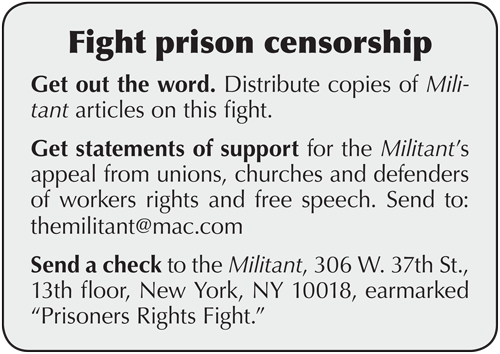
Vol. 81/No. 40 October 30, 2017
(front page)
Florida prison officials step up censorship
against ‘Militant’
That same day the Militant received notice that the Sept. 11 issue had been barred. The reason this time? A front-page article on a San Francisco protest against racism and one explaining why working people should defend the right to free speech. Both articles appeared under a banner headline reading, “Socialist Workers Party: Protest Racist Attacks!”
“This censorship is politically motivated and undemocratic,” said Militant editor John Studer. “As working people are facing more and more attacks from the bosses and their government, the rulers and their prison authorities are afraid there are protests to come. So they clamp down on constitutional rights.
“Prisoners have the right to read and consider a wide range of views, to think for themselves, to know what is going on in the world,” Studer said. “And the Militant has the right for our newspaper and our editorial views to be available to our readers within prison walls.”
In the Militant’s appeal of this latest impoundment, David Goldstein, the paper’s lawyer, states, “Certainly it is not possible that a newspaper can be banned for the words ‘protest racist attacks.’”
The first article, which had a subhead “Join Debate on How to Fight Effectively,” contained “no support or advocacy of violence or unlawful protests of any kind,” Goldstein said.
The second article — with the subhead “Liberals, ‘Antifa’ Combine to Deal Blows to Political Rights” — “also contains nothing that could justify the censorship,” Goldstein said. “It criticizes ‘Antifa thugs’ for attacking supporters of Trump and for intimidating or preventing the exercise of free speech rights.”
Since 2013 the Florida prison authorities have impounded more than a dozen issues of the Militant. Most were reversed — and the papers given to the workers behind bars who had subscribed — after the Militant filed appeals with the Literature Review Committee.
So far this year Florida prison authorities have impounded seven issues. The committee reversed three of the bans, upheld three, and are still considering the most recent appeal.
The fight against censorship of the Militant in Florida prisons is part of a broader fight for prisoners’ right to read political literature. Over the last year the Militant has fought prison censorship at Attica Correctional Facility in New York and Illinois River Correctional Center in Canton, Illinois. Other publications have also faced impoundment, including the San Francisco Bay View; Workers World, which has had multiple issues rejected by the Pennsylvania Department of Corrections; and Prison Legal News, which has had to fight bans across the country.
In fact, on a number of occasions, Florida prison authorities have sent notices of impoundment of Prison Legal News mistakenly to the Militant.
Militant editor Studer sent a letter of solidarity to Workers World’s editor after learning of the impoundment of their Aug. 31 issue by the Pennsylvania Department of Corrections, the fourth time this year Pennsylvania prison officials have censored the paper.
“All those who support civil liberties, democratic rights, the rights of workers behind bars and the struggles of working people should back your fight against censorship,” Studer said.

The Militant has won broad support. Among the groups that have sent statements of support for the Militant’s fights against prison censorship in Florida and New York are: Amnesty International; Pen America; New York Civil Liberties Union; the American Civil Liberties Union of Florida; Riverside Church Prison Ministry; Heather Ann Thompson, author of Blood in the Water: The Attica Prison Uprising of 1971 and Its Legacy; National Lawyers Guild; and many more.
See the box above for how you can help join the fight against prison censorship.
Front page (for this issue) | Home | Text-version home